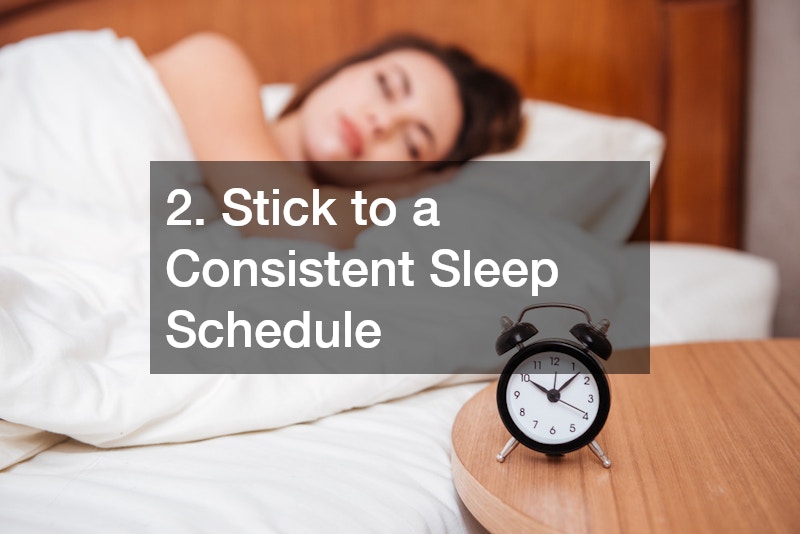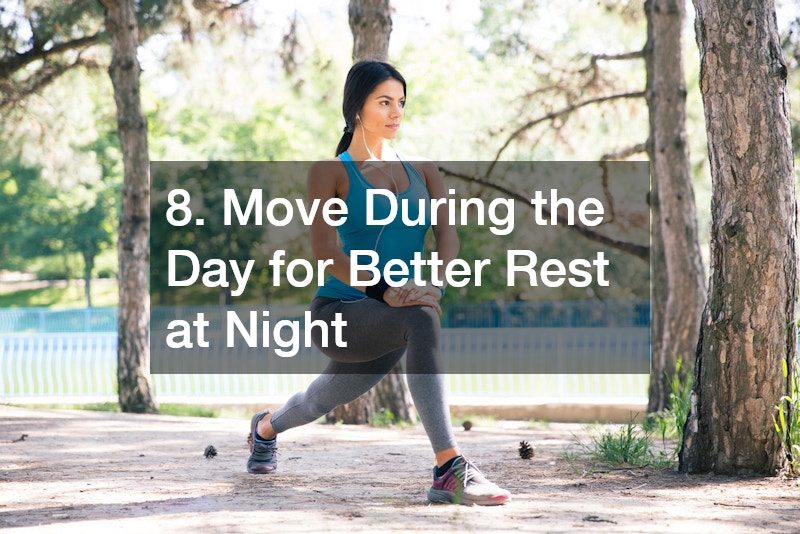Good sleep isn’t just about how long you’re in bed — it’s about how well you rest. Whether you’re tossing and turning, waking up tired, or just not feeling refreshed, improving your sleep quality can change everything. From your mood and focus to your immune system and skin, sleep affects it all.
Here’s how to level up your nightly routine and finally start waking up rested and ready for anything.
1. Understand What Quality Sleep Really Means
When people talk about getting “enough sleep,” they often focus on the number of hours — but quality sleep is much more than just time spent in bed. Real rest happens when you cycle through all the stages of sleep: light, deep, and REM (rapid eye movement).
-
Light sleep helps your body transition between wakefulness and deeper sleep.
-
Deep sleep is where your body repairs tissues, strengthens your immune system, and restores physical energy.
-
REM sleep is when your brain processes emotions, memories, and learning.
If you wake up feeling groggy even after eight hours, you might not be getting enough deep or REM sleep. That’s why things like noise, light, or even stress can seriously affect how restful your nights are.
Quality sleep means you wake up feeling refreshed, alert, and ready to take on the day — not counting down the hours until your next nap.
2. Stick to a Consistent Sleep Schedule

Your body runs on an internal clock called the circadian rhythm. It loves routine — so when you go to bed and wake up at the same time every day, it helps your body naturally know when to feel sleepy or awake.
Try this:
-
Pick a bedtime and wake-up time that you can realistically stick to, even on weekends.
-
Avoid staying up late or sleeping in more than an hour off your normal schedule.
It might sound boring, but consistency is key. When your body knows what to expect, it starts producing melatonin (your sleep hormone) at the right time every night. After a week or two, you’ll find yourself naturally getting tired right around bedtime — no forcing required.
And yes, this means saying goodbye to those Sunday morning sleep-ins that make Monday extra rough. Your future well-rested self will thank you.
3. Create a Relaxing Bedtime Routine
A relaxing bedtime routine tells your brain it’s time to wind down. Think of it as a signal that the day is wrapping up and your body can shift into rest mode.
Here are some ideas you can mix and match:
-
Dim the lights an hour before bed.
-
Read a light book or listen to soothing music.
-
Take a warm shower or bath — the drop in body temperature afterward helps you fall asleep faster.
-
Do gentle stretches or try a few minutes of meditation.
-
Turn off screens at least 30 minutes before bed.
Avoid anything too stimulating — like checking emails, doom-scrolling, or watching intense shows. The goal is to help your mind slow down, not rev it up.
Once you find a routine that feels calming, do it nightly. Repetition helps your brain associate those habits with sleepiness.
4. Keep Your Bedroom Cool, Dark, and Quiet
Your environment plays a massive role in how well you sleep. The perfect sleep setup? Cool, dark, and quiet. Let’s break it down.
Cool
The ideal temperature for restful sleep is around 18–20°C (65–68°F). A room that’s too warm can leave you tossing and turning, while a slightly cooler space helps your body wind down naturally.
If you find yourself constantly adjusting the thermostat, it might be time to have your HVAC system checked to make sure it’s running efficiently. A reputable HVAC company can help you fine-tune temperature control, balance humidity, and ensure proper airflow — all key factors for a comfortable night’s rest.
You can also layer breathable sheets, use a fan, or crack open a window for fresh air. Keeping your sleep space cool sets the stage for deeper, uninterrupted rest.
Dark
Even the smallest light sources — like streetlights, phone screens, or a glowing alarm clock — can interfere with melatonin production and make it harder to fall asleep. Total darkness helps your body recognize it’s time to rest.
Consider installing blackout curtains or trying residential window tinting services to reduce outside light and glare while maintaining privacy during the day. You can also add an eye mask or choose dimmable bedside lighting for better control.
The darker your room, the faster your body relaxes into a healthy sleep rhythm.
Quiet
Silence is golden when it comes to sleep. But if you live in a noisy neighborhood, have a snoring partner, or are constantly distracted by city sounds, creating a peaceful sound environment can make a big difference.
Try using a white noise machine, a gentle fan, or soothing nature sounds to mask background noise. Heavy curtains, rugs, or upholstered headboards can also absorb sound and make your bedroom feel cozier.
A quiet, calm atmosphere helps your body associate the space with relaxation — exactly what you need for deep, restorative sleep.
5. Upgrade Your Sleep Setup: Mattress, Pillows, and Layout

If your mattress has lumps or your pillow leaves your neck sore, no bedtime routine can save you. Your sleep setup matters — a lot. Investing in quality mattresses can make a big difference in how well you rest and how your body feels each morning.
Here’s what to focus on:
-
Mattress: Replace it every 7–10 years or when it starts sagging. A medium-firm mattress usually supports most sleep positions.
-
Pillows: Your pillow should keep your head aligned with your spine — not too high or too low. If you’re a side sleeper, a thicker pillow works best; back sleepers usually prefer medium thickness.
-
Bedding: Breathable, natural fabrics like cotton or bamboo help regulate temperature.
-
Layout: Position your bed away from windows or vents, and minimize clutter. A tidy space promotes a calm mind.
Don’t forget to clean your bedding regularly. Dust mites and allergens can cause sneezing or congestion that disrupts your sleep without you realizing it.
6. Choose the Right Colors and Textures for Rest
Your bedroom’s color palette can subtly influence how relaxed you feel. Bright reds or neon tones can be energizing — great for a home gym, not so much for a sleep zone.
If you’re considering a refresh, hiring professional painting services can help you achieve a smooth, calming finish that truly transforms your sleep space.
Instead, go for calming hues like:
-
Soft blues (reduce stress and lower heart rate)
-
Muted greens (bring a natural, restful vibe)
-
Warm grays or beiges (neutral and grounding)
Textures matter too. Choose cozy, breathable fabrics — think linen curtains, cotton throws, or a plush rug. The goal is to create a sensory experience that feels soothing the moment you walk in.
If you want to personalize it further, use dimmable warm lighting or add scent diffusers with lavender or chamomile. The calmer the environment, the easier it’ll be to drift off.
7. Maintain a Good Sleeping Posture
Your sleep posture has a big impact on how your body feels when you wake up. If you’re dealing with neck stiffness, lower back pain, or numb arms in the morning, your position might be to blame. Many chiropractors emphasize that proper spinal alignment during sleep is essential for preventing tension and long-term discomfort.
Here’s a quick guide:
-
Back sleepers: Use a medium pillow to support your head and a smaller one under your knees to ease pressure on your spine.
-
Side sleepers: Keep your legs slightly bent and place a pillow between your knees to align your hips.
-
Stomach sleepers: This position can strain your neck and back. If it’s the only way you can fall asleep, use a very thin pillow or none at all.
A supportive mattress and pillow setup go hand in hand with good posture. When your body stays aligned, your muscles can fully relax — giving you deeper, uninterrupted sleep.
8. Move During the Day for Better Rest at Night

If you’ve ever felt extra sleepy after a busy day, that’s your body telling you something. Regular movement helps improve sleep quality by tiring your muscles, boosting circulation, and keeping your internal clock in sync. Staying active during the day helps your body naturally crave rest at night.
You don’t need to train like an athlete to see results. Even light to moderate exercise can do wonders:
-
Morning walks or light jogs to wake up your body
-
Yoga or stretching in the afternoon to ease tension
-
A quick bodyweight workout before dinner to release energy
If you prefer something more dynamic, try joining a martial arts class — it’s great for building strength, discipline, and stress relief, all of which contribute to better sleep. Or, if you need guidance and accountability, a personal trainer can help design a balanced workout routine that suits your schedule and fitness level.
Just avoid intense workouts right before bed — they can raise your heart rate and body temperature, making it harder to fall asleep. Getting sunlight during the day also boosts your sleep rhythm. Try to spend at least 15–30 minutes outdoors daily to help your body distinguish between “daytime alert” and “nighttime rest.”
9. Watch What You Eat and Drink Before Bed
Your evening choices can make or break your sleep. Some foods and drinks help you relax; others keep your brain buzzing when you’re trying to drift off.
Avoid these before bed:
-
Caffeine (coffee, tea, chocolate, energy drinks) — it stays in your system for up to 8 hours.
-
Alcohol — it might make you sleepy at first, but it disrupts deep sleep later in the night.
-
Heavy or spicy meals — your body focuses on digestion instead of resting.
Better bedtime options:
-
A light snack like banana with peanut butter, oatmeal, or yogurt.
-
Herbal teas like chamomile, valerian root, or peppermint.
-
Warm milk — the classic still works because it helps trigger sleep hormones.
Try to stop eating at least 2–3 hours before bedtime. You’ll rest easier when your stomach isn’t busy processing a late-night meal.
10. Manage Stress and Quiet Your Mind

Ever find yourself replaying the day’s conversations or worrying about tomorrow as soon as your head hits the pillow? You’re not alone — stress is one of the biggest sleep disruptors. When your mind stays in overdrive, your body struggles to relax, no matter how tired you are.
The trick is to find ways to quiet your mind before bed and let go of the day’s tension. Try:
-
Journaling: Write down your thoughts or tomorrow’s to-do list to get them out of your head.
-
Breathing exercises: Inhale for 4 seconds, hold for 7, exhale for 8. Repeat a few times.
-
Meditation apps or calming music: Help slow down racing thoughts and ease your mind into rest mode.
You can also incorporate calming physical activities earlier in the day. Enrolling in pilates classes is a great way to strengthen your body, improve flexibility, and release mental stress through mindful movement. If you prefer something more indulgent, visiting a med spa for a massage, facial, or aromatherapy session can help melt away tension and prepare your body for better sleep.
It also helps to create boundaries — like setting a “cutoff” time for work or screen use. Give your brain permission to switch off. And if you find stress constantly keeping you awake, consider talking to a therapist or counselor. Mental rest is just as important as physical rest.
11. Limit Daytime Naps
Naps can be lifesavers — but if you overdo them, they can mess up your nighttime sleep.
Here’s how to nap smart:
-
Keep naps short — around 20–30 minutes is ideal.
-
Nap earlier in the day, preferably before 3 p.m.
-
Avoid napping too close to bedtime; it confuses your body’s sleep signals.
If you constantly feel the need for long naps, it might be a sign you’re not sleeping well at night. Instead of leaning on naps as a fix, focus on improving your nighttime sleep habits first.
Short “power naps,” though, can help boost alertness and mood — just don’t turn them into full-on slumber sessions.
12. Get Checked
If you’ve tried every trick in the book and still wake up exhausted, it might be time to talk to a doctor. Sleep issues like insomnia, sleep apnea, or restless leg syndrome often go undiagnosed — but they can seriously affect your health and energy levels.
Common signs you might need a checkup include:
-
Loud snoring or gasping for air while sleeping
-
Waking up with headaches or dry mouth
-
Constant fatigue, no matter how much you sleep
-
Trouble concentrating during the day
A medical professional can recommend tests, treatments, or lifestyle adjustments. Sometimes even a small change — like a CPAP machine for apnea or adjusting medications — can make all the difference.
Don’t just accept poor sleep as “normal.” Good rest is one of the best gifts you can give yourself — and your body will thank you every single day.
Closing Thoughts
Better sleep doesn’t come from one big fix — it’s the result of small, consistent habits that tell your body, “Hey, it’s time to rest.” Start with one or two changes from this list, and build from there.
Whether it’s setting a regular bedtime, improving your bedroom setup, or just learning to unwind, these habits can transform your nights (and your mornings).
Remember — sleep isn’t a luxury. It’s a basic need. And when you finally start sleeping like a pro, everything else in life just feels easier.
